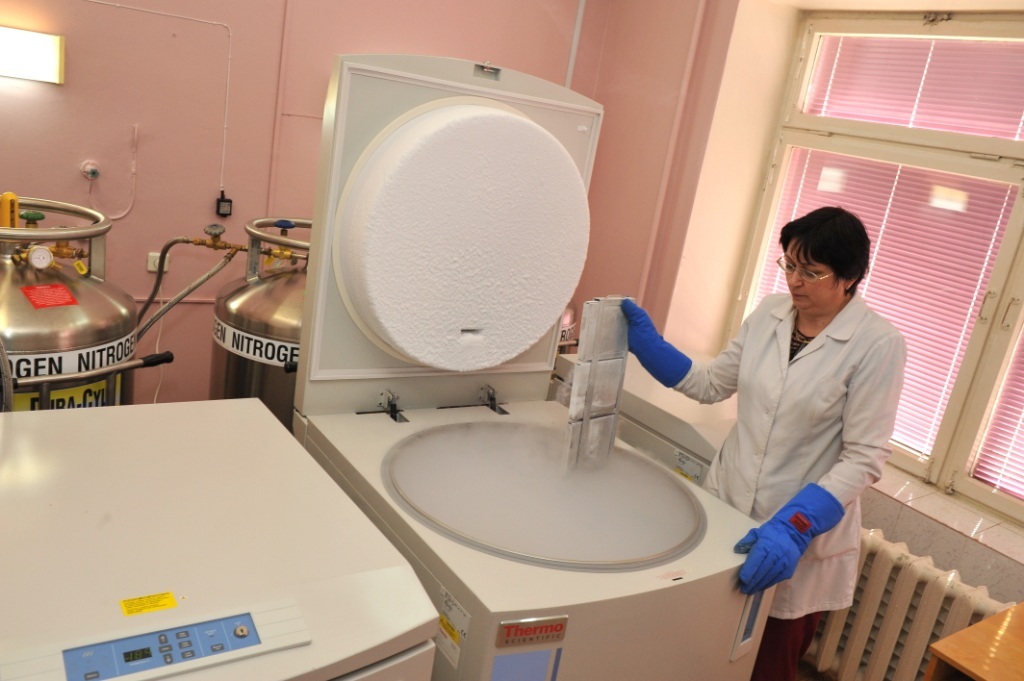Collection of umbilical cord blood

Umbilical cord blood is collected at maternity hospital (departments) of the Republic of Belarus. A certified obstetrician or physician performs the procedure. To collect umbilical cord blood ex utero, two medical specialists, usually an obstetrician and a physician are required.
In utero technique
After childbirth, the umbilical cord is clamped and cut. The umbilical cord is clamped as closer to a baby as possible. Before collecting cord blood, a physician places a sterile bag below placenta. The physician treats the site of puncture of the umbilical cord with 5% iodine solution and 70% alcohol solution before separating the placenta. After that the physician punctures the umbilical vein with a needle connected to the collection bag. Blood spontaneously flows into the collection bag within 5-10 minutes. Flow is induced by the gravitation and uterine involutions. Then the physician lifts the plastic tube to clear it from blood. The collection bag is clamped, or tied up (the knot shall be as far from the container and as closer to the needle as possible and shall be hard, so that to avoid leakage), and is put into the transportation container. The physician stirs the content of the bag from time to time so that to ensure that blood mixtures with anticoagulant. To obtain the necessary amount of blood and to prevent bacterial contamination, the placenta and umbilical cord are treated very carefully. In case of Cesarean section, umbilical blood is collected before the separation of the placenta.
Ex utero technique
The ex utero collection of umbilical blood cord takes place in case of placental abruption. The placenta is placed into a sterile dish. One medical specialist lifts the placenta 50-80 cm over the dish with the fetal surface down. Another physician treats the site of puncture of the umbilical cord with 5% iodine solution and 70% alcohol solution. After that the physician punctures the umbilical vein with a needle connected to the collection bag. Blood spontaneously flows into the collection bag. Then the bag is clamped and put into the transportation container.
Collection of umbilical cord blood for laboratory testing
During collection of umbilical cord blood in a delivery room, 3-4 ml of blood is taken and put into a disposable marked tube, containing a preservative, with a view to determining blood group and Rhesus factor. A physician makes an additional puncture of the umbilical vein and collects blood with a sterile syringe.
Marking
A container with umbilical cord blood is marked as follows:
- product name;
- have a “do not irradiate” label;
- recommended storage temperature;
- address and phone number of the umbilical cord blood bank.
A tube with umbilical cord blood is marked as follows:
- maternity patient’s full name;
- date of childbirth.
Marking is made with indelible ink.
An obstetric history is provided to the umbilical cord blood bank together with the container with umbilical cord blood. The obstetric history contains the following data: a mother’s full name, date and time of childbirth, details of the management of labour, baby’s sex/weight/height, full name and phone numbers of a physician, who collected umbilical cord blood, baby’s blood group and Rhesus factor (if applicable).
Transportation of umbilical cord blood
A duly marked container with the collected umbilical cord blood is placed into the transportation container. The storage temperature ranges from +18 to +23 C (room temperature). The container with umbilical cord blood shall not be exposed to direct sunlight or stored in a fridge. The container is delivered to the umbilical cord blood bank for processing and storage. It shall be processed within 36 hours after collection.